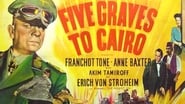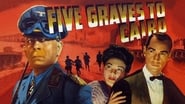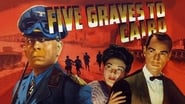UnowPriceless
hyped garbage
Stevecorp
Don't listen to the negative reviews
Arianna Moses
Let me be very fair here, this is not the best movie in my opinion. But, this movie is fun, it has purpose and is very enjoyable to watch.
Derrick Gibbons
An old-fashioned movie made with new-fashioned finesse.
MisterWhiplash
I went into Five Graves to Cairo only knowing that this was Billy Wilder's attempt to make some pro-ally style war movie, and that it was one of Quentin Tarantino's favorite films - anyone with two eyes and ears can tell it's a big influence on Inglourious Basterds - and finally seeing it, it holds up, as far as it goes. It's not something that is reliant on a lot of battles or action in the sense one might expect from a lot of war films. The Tarantino connection is a lot thicker than one might expect; Wilder in 'Cairo' is all about mounting suspense and keeping up the rouse of Franchot Tone's JJ Bramble turned German spy turned English hotel waiter Paul Davros around a bunch of German officers occupying the hotel while planning an offensive maneuver in North Africa.Every moment is tense and taut when this man is around these officers, and while Tone is not the best or most expressive actor of his time he does enough for what the role and Wilder ask of him, giving some charm and personality to a character who has to be different things at different moments. Part of it also comes from who knows what piece of information, the fact that from the start some p-eople know more than others (as, in a fantastic opening that sets much of the tone, Bramble stumbles sun-baked into the hotel after leaving his blown-apart tank, and Tamiroff and Anne Baxter have to do their best to make sure the Germans don't see him behind the bar, which does get moved mid-scene), and that there is other stakes going on, like with Baxter's man in a prison camp.All the while, Wilder gives some wonderful scenes for Peter van Eyck, who's the Lieutenant overseeing the operation, and his commanding officer especially Erich von Stroheim. Von Stroheim is the strongest part of the film, as every time he gives this character dimension and presence, and how every line is delivered makes him a man who is clearly out to do his duty as a Nazi officer on the move towards Egypt (and those 'five graves', which becomes a plot point but isn't as important as seeing what the characters do about it), but is also a sort of a human villain, if that makes sense. I'd almost go as far as to say he makes this field Marshall cunning but also someone who you understand completely: he's doing his job the way he's been trained, and his ambition (some of his officers are astounded he wants to go as far as he plans, with salt shakers on a table demonstrating), and there's some of that same dimension he brought to Grand Illusion. We know he's the villain of the piece, but you can't take your eyes off of him from the moment he's on screen - and Wilder opens on him from behind his head giving orders! I don't know if Tamiroff came off the best here, as he is sort of one-note through most of the run time as the nervous nellie (over?)reacting to every little or big move. And it does still operate on the wave of it being made during the war, with the side clearly drawn (though, again, the Germans are made to not be simply automatic monsters, but people you are meant to understand their motivations, cruel as they end up being, like Rommel's 'papers in triplicate' command to Anne Baxter). But aside from that, it's a generally smart and intense film that relies all on character motivation and that dialog IS the plot, in a sense here. It's a bottle-movie as about 90% of it takes place indoors, but it doesn't operate like a play, despite it being adapted from one. And the ending, or denouement I should say, packs a good emotional wallop redeeming any slow moments.
classicsoncall
It's remarkable how interesting a war time espionage film can be, while at the same time requiring major suspension of disbelief throughout the story for various reasons. The major one here for me related to the character of actor Franchot Tone impersonating a German undercover spy. Throughout the entire film, not one German officer or soldier thought it appropriate to address him in the mother tongue. There were plenty of opportunities, as German was used sporadically in the story at various times. At least in the interest of being cautious with captured British officers around, one would think Field Marshal Rommel (Erich von Stroheim) or Lieutenant Schwengler (Peter van Eyck) might have addressed Bramble/Davos in German, especially in the early going when all the characters at the Hotel Empress would have come under suspicion.Which brings me to my next point. You probably wouldn't need to know a thing about General Rommel to question why he would speak freely of German military strategy in the presence of English officers. I don't think so. As for the casting of Erich von Stroheim as Rommel, there was no physical resemblance to speak of. My idea for the role would have been someone like Conrad Veidt who portrayed Major Strasser in the Bogart film "Casablanca". Although with the timing of this picture, shooting schedules might have overlapped between the two.One more thing before I'm through. I thought the gimmick with the map and the letters spelling out 'EGYPT' was a fairly clever plot element, but there again, a bit of thought brings a big question mark. Given that any of the letters on the map might have represented an area covering hundreds of square miles, the resolution for the Allies wouldn't have been as precise as the story suggests. Even given a general area in which to unearth the hidden military supplies, a fair amount of time would have been needed to discover a weapons cache.Still, even with all the perceived glitches in the story, I fond the story intriguing enough to hold my attention. All the principals did a good job, and I particularly liked the character of Farid (Akim Tamiroff), who was downright hilarious at times under stressful circumstances. I was also moved by Bramble's response to the Alsatian maid Mouche (Anne Baxter), who had an overbearing concern for her younger brother who was a prisoner of the Nazis. It appeared Bramble made his point when he stated - "It's not one brother that matters. It's a million brothers".
sogs
A really poor view of the events in North Africa during this time is presented in true Hollywood irrelevance. Rommel, of course was nothing like this portrayal given from Von Stroheim. The desert war was a remarkably clean one, given the period and executing hotel maids was not really one of Rommel's personal involvements at any given stage. The ludicrous plot centralizing on Tones spy role is more comedy than reality. Its a low score here for me as given the time, it would have been better to have portrayed some sense of fact than fiction. Flag waving manure as are so many for this period but this seems to be one that could have graduated above the rest. Had the effort been made. It failed.Avoid.
edwagreen
An extremely interesting plot becomes tedious at best in this 1943 film. British officer Franchot Tone finds himself on a remote part of the Egyptian desert with proprietor Akim Tamiroff and maid Anne Baxter, the Nazis soon arrive and Tone makes believe that he is a waiter at the hotel who had been killed earlier in a bombing. The irony is that the waiter was working for the Germans.Rommel arrives at the hotel and is well-played by Erich Von Stroheim, who even looked old in 1943.The film suffers because it becomes way too talky and the action doesn't pick up until the very end. Baxter's ultimate sacrifice was not played well here. There needed to be more excitement, especially at that phase of the story.







